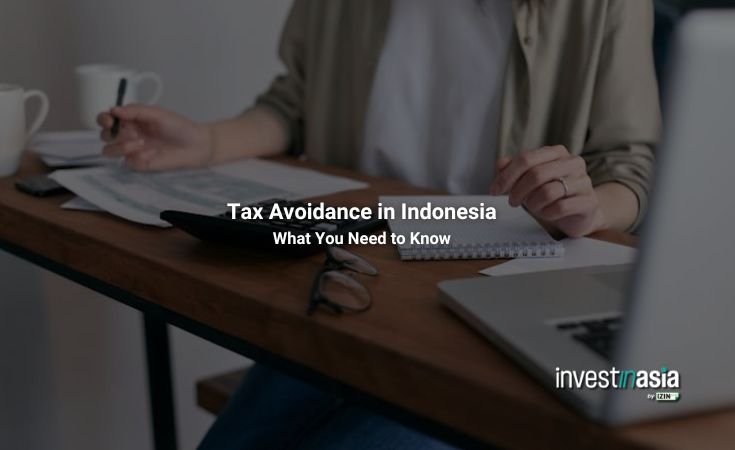If you’re a foreign investor or business owner considering operations in Indonesia, understanding the country’s tax system and its approach to tax avoidance is crucial. While Indonesia encourages foreign investment, it also has strict rules to prevent tax avoidance and ensure that businesses pay their fair share.
In this article, we’ll break down what tax avoidance means in Indonesia, how it’s tackled by the government, and the penalties involved.
Also read: Understanding Indonesia’s Tax Ratio: A Key Indicator for Economic Health
What is Tax Avoidance?
Tax avoidance refers to strategies that individuals or companies use to minimize their tax liability within the legal boundaries of the law. Essentially, it’s the process of planning financial transactions to reduce the amount of taxes owed. While tax avoidance is technically legal, it often exploits loopholes in the tax system that go against the spirit or intention behind the law.
In Indonesia, tax avoidance generally involves structuring transactions or business activities to legally reduce taxes owed, but it can still raise ethical and legal concerns. For example, companies might use complex financial schemes to shift profits or underreport taxable income.
Also read: Tax Holiday in Indonesia: A Comprehensive Guide for Foreign Investors
Common Methods of Tax Avoidance in Indonesia


Thin Capitalization
This practice involves companies increasing their debt levels to reduce taxable income. By borrowing more money, businesses can deduct interest payments as expenses, thereby lowering their taxable profits. The Indonesian government has set limits on this through the Debt to Equity Ratio regulation to prevent excessive tax avoidance.
Transfer Pricing
Multinational companies operating in Indonesia often engage in transfer pricing, where they shift profits between subsidiaries in different countries to minimize taxes. Indonesia’s tax authorities have strict rules to ensure that the transfer prices set between related companies are fair and reflect market values.
Controlled Foreign Corporation (CFC) Rules
Indonesia enforces CFC regulations to prevent the practice of transferring profits to countries with lower tax rates. These rules target domestic taxpayers who own foreign companies and ensure they report income generated overseas for tax purposes.
Treaty Shopping
Some businesses attempt to take advantage of double taxation agreements (DTAs) to avoid higher taxes in Indonesia. Indonesia’s anti-treaty shopping rules aim to prevent abuse of these treaties by ensuring that tax benefits are only applied to entities that genuinely qualify for them.
Use of Tax Havens
Similar to treaty shopping, some companies attempt to funnel profits through tax havens or countries with lower tax rates to reduce their overall tax burden in Indonesia. The Indonesian government has been working to close these loopholes.
Also read: Indonesia Tax Rate for Foreigners: What You Need to Know
Impact of Tax Avoidance on Indonesia’s Economy
Tax avoidance is a significant issue in Indonesia. According to the Tax Justice Network, Indonesia loses an estimated USD 4.86 billion (approximately IDR 68.7 trillion) annually due to tax avoidance practices. This loss severely impacts the country’s tax revenue and limits the government’s ability to invest in essential public services.
The government has been focusing on improving tax compliance and reducing these losses. In 2020, for instance, Indonesia’s tax authorities set a target of IDR 1,198.82 trillion in tax revenue, but the impact of tax avoidance meant that this target was not fully achieved. As a result, Indonesia faces a shortfall in funding for crucial sectors, including healthcare and infrastructure.
Also read: Progressive Tax in Indonesia: Complete Guide for Expats
Penalties for Tax Evasion and Avoidance


While tax avoidance itself isn’t illegal in Indonesia, tax evasion — which involves illegal activities to reduce tax liability, such as underreporting income or falsifying documents — can lead to significant penalties. Penalties for tax evasion in Indonesia can be severe, including hefty fines and even prison sentences. Companies caught evading taxes can face fines of up to 2-4 times the unpaid tax amount and imprisonment for up to 6 years.
To combat tax avoidance, Indonesia’s government has implemented several rules and regulations to ensure that businesses and individuals pay taxes fairly. These include Specific Anti-Avoidance Rules (SAAR), such as the anti-thin capitalization rule and transfer pricing guidelines, as well as General Anti-Avoidance Rules (GAAR), which target transactions that are primarily designed to avoid taxes.
Also read: Tax Treaty Indonesia: Countries List and Complete Guide
How Foreigners Can Navigate Indonesia’s Tax System
If you’re a foreigner looking to do business in Indonesia, here are a few tips to ensure you’re compliant with the country’s tax laws:
Understand the Tax Regulations
Be familiar with Indonesia’s tax laws, including those related to income tax, VAT, and corporate taxes. Seek professional advice to avoid inadvertently triggering tax avoidance concerns.
Be Transparent in Financial Reporting
Always provide accurate and complete financial records to Indonesian tax authorities. Underreporting income or inflating expenses could trigger an audit and lead to severe penalties.
Avoid Complex Tax Structures
While using international structures or subsidiaries to reduce tax liabilities is common, ensure that these structures have legitimate business purposes and are not solely designed to avoid tax.
Seek Expert Advice
Tax laws in Indonesia can be complex, and there are frequent updates to regulations. It’s essential to work with a local tax advisor who understands the nuances of the system and can help you navigate it legally and efficiently.
Also read: Filing Annual Corporate Tax Returns in Indonesia (Easy Guide)
While tax avoidance might be legally permissible in some cases, the Indonesian government has robust rules in place to prevent businesses from exploiting loopholes. Understanding Indonesia’s tax system and the various anti-avoidance measures is essential for anyone considering doing business in the country. Ensure that your business practices are transparent, legal, and ethical to avoid any penalties or reputational damage.
By adhering to these regulations and seeking professional guidance, foreign investors and businesses can contribute to Indonesia’s economic growth while ensuring full tax compliance.
Rely on Investinasia’s tax consultants to take care of your taxes
Navigating Indonesia’s tax regulations may seem complicated, but understanding the basics can save you time and money.
Hence, partnering with reputable consultants like InvestinAsia’s Indonesia tax consultant and compliance services can simplify your tax management and ensure full compliance with Indonesian tax laws.
Our experienced team of professionals is ready to assist you in every tax matter, such as:
- Accounting and tax reporting services in Indonesia
- Indonesia Payroll Service
- Indonesia LKPM Reporting Service
- Indonesia VAT Taxpayers Registration
Contact us now for FREE consultation and special package!
Sources:



